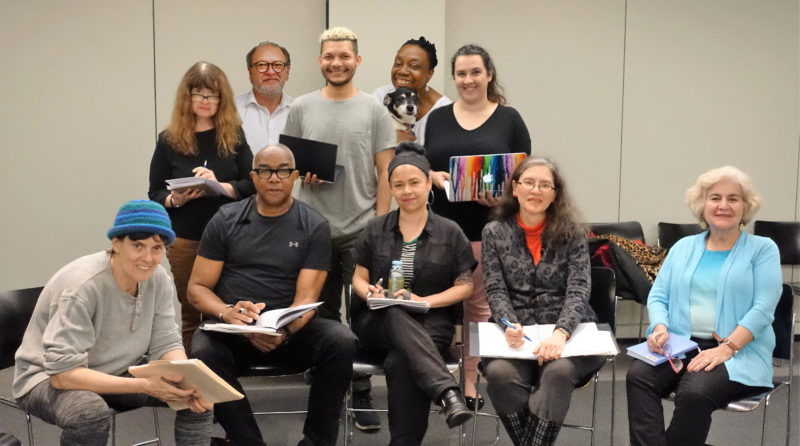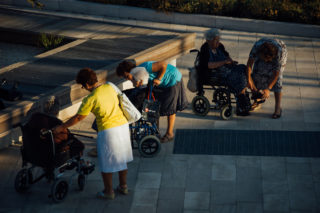Giggles were suppressed at the center of the room, where 10 strangers joined energy and made motions and sounds to create a machine, possibly mass-producing bread, or perhaps hauling water from a river, or maybe spinning earth around in a mine. The product was not as important as understanding each person's role and responding to it to create one unified purpose. Joe White, an accomplished theater veteran who has worn many hats in the theater world, guided the exercise with the intent of warming up the first class and getting folks comfortable with each other. "The human machine," as the exercise is called, is an apt metaphor for what the workshop participants have already been doing for years in their roles as caregivers, who are expected to quickly adapt to the needs of their family members who are in need. It is an artful dance involving mealtimes, drives to the doctor, and navigating the Medicaid system.
Starting on February 28, 2018, a group of CUNY professors from all the boroughs gathered every Wednesday night at The CUNY Graduate Center, with the intent of creating plays that exemplify the work they do as caregivers. This workshop, sponsored by the Labor of Care Archive (led by Kathy McDonald) from The Center for Humanities, allowed the writers to use the arts to understand their caregiving roles a bit better. White, who led these workshops as part of Working Theater’s TheaterWorks! program, had workshop members create at least three different machines, all of which had their own unique rhythm. At the end of the exercise, everyone laughed and felt ready for whatever came next.
Dr. Willie Tolliver, an associate professor at Hunter College's Silberman School of Social Work, said, "The workshop appealed to me because of my caregiving responsibilities for my mom before she died in 2003. In addition, this past January I became the legal guardian for my sister, who is developmentally delayed. I came to the workshop because I believe the arts can be a space for healing." For Prof. Constance H. Gemson, a lecturer at LaGuardia Community College and published essay writer and poet, the workshop was an opportunity to "to let go and listen and learn from Joe and others" in the form of playwriting. Others had the desire to honor the legacy of their family or record their current experiences.
Weekly workshops initially included writing exercises such as monologues and poetry, but the writing quickly became focused on playwriting, with lessons on dramatic structure, setting, character, action, and dialogue. Prof. Diana Murillo, lecturer at Kingsborough CC, said that "working two jobs, babysitting, and coming every week to the workshops" was challenging. Through the brittle cold of winter storms and the sadness of family emergencies, everyone stayed focused on the goal of putting the plays together, eventually helping each other with rewrites and acting out each other's plays to hear the beats of the scenes. Prof. Marco Bernal-Salas, lecturer at Bronx Community College and seasoned film and television writer, thought that "writing a play would be easy [but]….although some ideas are similar, theater is more poignant because of the conflicts presented in each scene and what we - writers - need to consider in order to create realistic characters." Indeed, White tirelessly provided the writers with notes and comments both in class and in writing. Revisions were about 75% of the process, and the writers developed a familial atmosphere. This included having a workshop mascot, in the form of Valentina, a companion dog belonging to Dr. Valerie Knight, who has her own private practice and teaches at The College of Staten Island. Participants shared snacks while working and kept Valentina from any scraps that might have fallen on the floor.
Rehearsals currently are underway, and there are several professional actors set to give life to the playwrights' words. Kit Flanagan, Kris Sidberry, and Flaco Navaja, all of whom have many theater, film, and television credits, will perform the reading alongside some of the workshop participants. White and David Smilow, also a TV and theater veteran, will co-direct the plays. The performance "TheaterWorks!: Short Plays On Caregiving at CUNY" takes place on May 22, 2018, at The Graduate Center's Elebash Recital Hall, at 7 p.m., and it's free and open to the public. Topics include, but are not limited to, visits by ghosts from the past, family squabbling about memorial services, conversations with children who have terminal illnesses, and celebrating life despite the downer days of caregiving. All participants are greatly anticipating the culminating event but agree that the process itself was the most exciting part. When asked what they especially liked about the workshop, Bernal-Salas stated, "The collaborative process….Through tears and laughter, the class, and everyone around it has come together and closer to achieve its objective." Gemson feels that she has "grown and stretched in writing and performing." Prof. Andrea Tienan, lecturer at Baruch College, marveled, "I've never taken a writing workshop and….I guess just the fact that I finished a play is pretty exciting for me."
As a workshop participant myself, I can attest that it has been an incredible experience to not only work on my own writing process but also to witness and help other folks bring their vision to life. Joe was thoughtful and kind, asked questions, and made sure he understood what we were trying to do. Similarly, the tone he created ensured that all writers treated each other the same way, which reminds me of the human machine we started with. I was able to see how my own household, during our best moments, is a space where we try to exhibit kind listening in order to adapt to family members' needs, and how not listening can jam the cogs in the mechanism. The balance is challenging, and other workshop participants felt the same way. As John Reid Currie, director of the Center for Student Accessibility at New York City College of Technology said, "Joe and the group really gave me a new way of seeing my family life, my work life and how best to keep them both in perspective." The trick of it is seeing what someone else is doing—or going through—and adjusting your own behavior so that their job, or vision, comes to fruition. You can add your own perspective to it, of course, but the main task is to see and listen and, hopefully, help. Each night we returned to our families with the same mission. I know that writing something as simple as a 10-minute play cannot change the world, but it certainly has allowed me to have a different perspective on my family, and how I might be most useful. I think that is enough.


